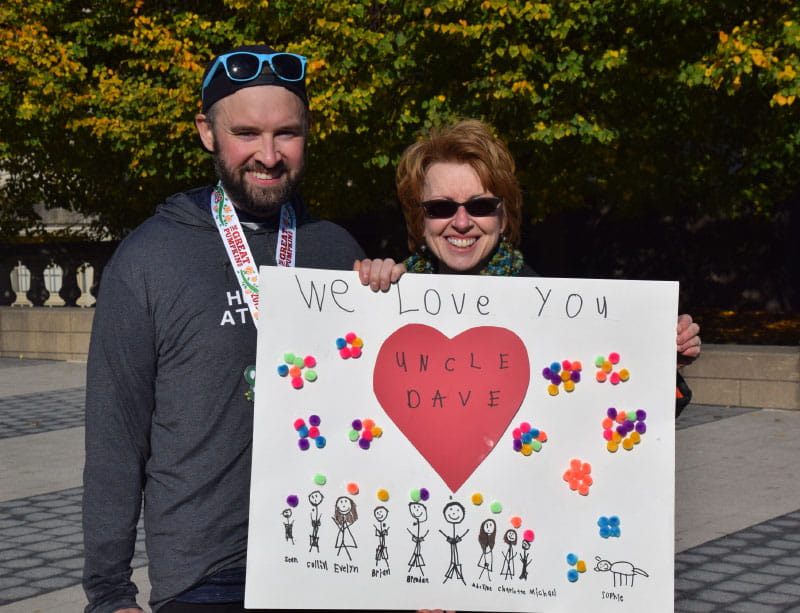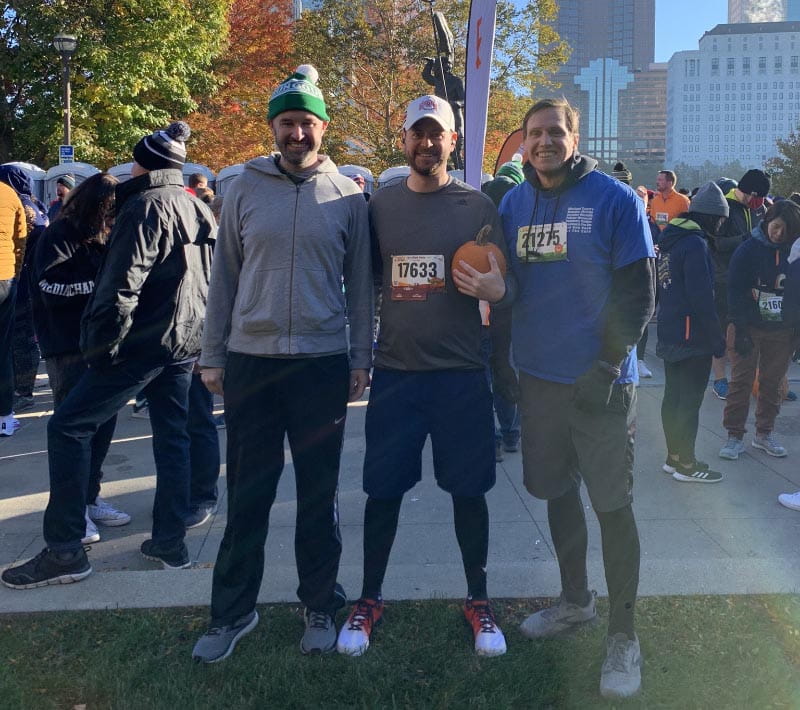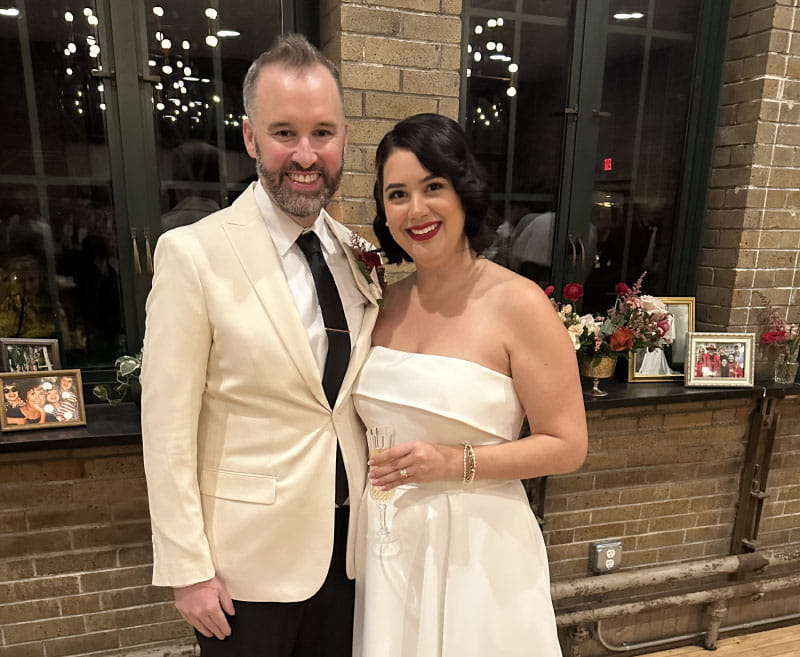What he thought was pneumonia turned out to be heart failure – at age 30
By Diane Daniel, American Heart Association News

Dave Conway felt his legs tremble as he carried a 50-pound bag of corn to pour into a batch of bourbon.
As a craft distiller in Columbus, Ohio, Conway's days were long and physically taxing. The job included rolling barrels filled with bourbon, operating heavy machinery and scrambling up and down ladders in rooms that often topped 90 degrees.
Normally he worked up to 12 hours without a problem. But over the course of a few summer weeks, just after his 30th birthday, his daily duties were wearing on him.
This must be what 30 feels like, he thought.
While at work, Conway would usually grab a quick bite to eat at a fast-food restaurant. In the evenings, he often hosted trivia nights at local pubs. Weekends, he'd hang out with friends at a bar or go to distillery events. He'd gained about 25 pounds since graduating from college. He didn't exercise, but his job kept him physically active.
One day in early September 2018, Conway was even more exhausted than usual. He felt lightheaded and nauseous, with a heaviness in his chest. After checking his symptoms online, he blamed heat exhaustion and assumed he'd feel better soon.
Two weeks later, he was even worse. He tired just walking to his car. Standing in the shower became so exhausting that he started taking baths.
Sick of feeling sick, he decided to go to urgent care on a Sunday afternoon. He expected a diagnosis of pneumonia and medication to clear it up.
"Your lungs are clear, but your blood pressure and pulse are way above where they should be," the doctor told him. "You need to go to the emergency room now."
Conway was annoyed but followed orders.
At the hospital, doctors could see his body was in distress, but they didn't know why.
An echocardiogram showed that his heart was pumping only 10% of the blood from his heart to his body. This measurement is known as ejection fraction. Normal range is between 55% and 70%. Anything below 40% is considered heart failure.
Conway called his sister Kate, who is a doctor. When he told her his test results, she was alarmed. She called their parents, who live a few hours away. She told them it was serious and they should pack for longer than a night or two.
Once his parents and Kate arrived, Dave started to worry.
Doctors said his heart, liver and kidneys weren't performing well, but they didn't know why. He was lucky to be alive, they said.
On Dave's fifth night in the hospital, while sitting with her son, Mary Ann Conway detected his speech slurring and a weakness in his right side. As a physical therapist, she knew those were signs of a stroke. Dave had two more strokes over the following two days.
With more testing, doctors determined Dave had had a heart attack – probably that day in early September when he thought he was experiencing heat exhaustion.
Dave was still dealing with a 100% blockage in a major heart artery. Because of scarring around that blockage, it was too late to place stents or do a bypass, doctors said. Other arteries had begun to compensate and would continue to be relied upon.
Within the first week, Dave's speech was pretty much back to normal. He had mild aphasia, meaning that he knew what he wanted to say but he couldn't find the words. Although it improved quickly, it lingered at a low level.
After 12 days in the ICU, Dave was sent home with a long list of medications. Mary Ann retired early from her job to care for him.
Dave's energy level was extremely low. His efforts to build it up moved slowly.
He wore a defibrillator vest that, if needed, can send electrical pulses to the heart to attempt to restart it after a cardiac arrest. He became afraid to sleep, fearing he'd never wake up. A therapist helped him sort through his emotions.
"I would feel guilty about being depressed because I knew how lucky I was to be alive," he said.
Mary Ann made sure he got speech therapy and pushed for cardiac rehabilitation to start as soon as possible. She drove Dave to his appointments, cooked and cleaned.
"He certainly didn't want to be living with his mother," she said. "But Dave never complained. He was grateful to have another chance."

One of his first outings was to his regular Monday trivia hosting gig. Mary Ann sat with his friends for several weeks of game playing. It felt like a lifeline to normalcy.
At cardiac rehab, Dave slowly started getting his strength back. His endurance grew from a 30-second walk to a 10-minute jog.
Dave vowed to do everything he could to get better. That included cutting out alcohol and reducing sodium and getting regular exercise. His heart will always be weaker, but he can lead a full life.
"I felt like a part of me that walked into the hospital never left," he said. "I came out a different person. Alcohol was a way to mask my emotions. That side of myself didn't follow me to where I am now."
In February 2019, five months after his heart attack, Dave received an implantable defibrillator as a precaution. The device can detect a dangerously irregular heartbeat and deliver a shock to get the heart back into a normal rhythm.
Mary Ann was finally able to go home, though she and her husband continued to visit Dave often.
For exercise, he does yoga and runs, and has completed 10K races. His running partner is a friend and former drinking buddy who has lost more than 100 pounds since they started hitting the pavement.

Now 35, Dave has earned an undergraduate degree in psychology and is enrolled in a master's program. He recently started a job as a vocational rehabilitation counselor, helping people with disabilities succeed in the job market. And this month, he got married. The engagement party for Dave and MacLaren, who he met after his heart attack, was secretly a wedding.
Dave said that, for the first time in his adult life, he's truly happy.
"My philosophy is to learn from yesterday, be happy for today and work toward a better version of myself for tomorrow," he said. "I have a life worth living."

Stories From the Heart chronicles the inspiring journeys of heart disease and stroke survivors, caregivers and advocates.





